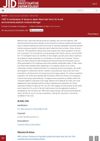 5 citations,
May 2023 in “Frontiers in immunology”
5 citations,
May 2023 in “Frontiers in immunology” Environmental factors like diet and vitamin levels, especially Vitamin D, can affect autoimmune diseases differently, with lifestyle changes potentially improving outcomes.
 5 citations,
July 2021 in “Basic & Clinical Pharmacology & Toxicology”
5 citations,
July 2021 in “Basic & Clinical Pharmacology & Toxicology” Melatonin may protect ear cells from damage caused by nicotine.
[object Object]  3 citations,
June 2021 in “Journal of affective disorders”
3 citations,
June 2021 in “Journal of affective disorders” Hair cortisol and cortisone levels may affect how work stress influences depression in Chinese fishermen.
 1 citations,
July 2022 in “Han'gug sigpum yeong'yang gwahag hoeji/Journal of the Korean society of food science and nutrition”
1 citations,
July 2022 in “Han'gug sigpum yeong'yang gwahag hoeji/Journal of the Korean society of food science and nutrition” Eurycoma longifolia extract may help increase testosterone levels and reduce andropause symptoms.
 August 2024 in “Biomolecules & Therapeutics”
August 2024 in “Biomolecules & Therapeutics” A new compound, HTPI, promotes hair growth by protecting cells from damage and regulating energy use.
 November 2023 in “Curēus”
November 2023 in “Curēus” Higher stress levels are linked to more skin problems, especially in young women.
 May 2023 in “Animal Reproduction Update”
May 2023 in “Animal Reproduction Update” High levels of cortisol in hair show long-term stress which can lower fertility in animals.
 108 citations,
July 2004 in “American Journal of Pathology”
108 citations,
July 2004 in “American Journal of Pathology” Stress increases a factor in mice that leads to hair loss, and blocking this factor may prevent it.
 40 citations,
November 2011 in “American Journal of Human Biology”
40 citations,
November 2011 in “American Journal of Human Biology” Stress from being transgender is linked to higher blood pressure at night and more inflammation, which may affect heart health.
 21 citations,
January 1988 in “Stress Medicine”
21 citations,
January 1988 in “Stress Medicine” Stress affects skin health and emotional well-being should be considered in skin disease treatment.
 14 citations,
April 2005 in “Experimental Dermatology”
14 citations,
April 2005 in “Experimental Dermatology” Stressed fibroblasts greatly increase melanin production in hair, skin, and eye cells, mainly due to a growth factor called bFGF.
 20 citations,
November 2019 in “Biomolecules”
20 citations,
November 2019 in “Biomolecules” Finasteride reduces response to stress and rewards, affecting behavior and mental health.
 March 2024 in “Journal of pharmacopuncture”
March 2024 in “Journal of pharmacopuncture” Hominis Placenta Pharmacopunture helped regrow hair in a patient with stress-induced hair loss.
 3 citations,
October 2022 in “Han'gug dongmul jawon gwahag hoeji/Han-guk dongmul jawon gwahak hoeji/Journal of animal science and technology”
3 citations,
October 2022 in “Han'gug dongmul jawon gwahag hoeji/Han-guk dongmul jawon gwahak hoeji/Journal of animal science and technology” Adding L-glutamine to the diet of Hanwoo steers may boost their immune system and help them cope with heat.
1 citations,
July 2021 in “IntechOpen eBooks” Environmental factors can cause mutations in skin proteins, leading to skin disorders.

Combining stress management and Minoxidil helps treat stress-related hair loss and improve well-being.
 109 citations,
October 2007 in “Journal of pineal research”
109 citations,
October 2007 in “Journal of pineal research” Melatonin helps regulate hair growth and protects the hair follicle from stress.
 13 citations,
December 2016 in “PubMed”
13 citations,
December 2016 in “PubMed” People with a common type of hair loss have higher stress levels in their body, and treatments that reduce this stress could help.
 5 citations,
September 2022 in “Antioxidants”
5 citations,
September 2022 in “Antioxidants” A substance from Caulerpa racemosa seaweed may protect against skin damage caused by air pollution by reducing oxidative stress and cell death.
 April 2023 in “Journal of Investigative Dermatology”
April 2023 in “Journal of Investigative Dermatology” Honey mixture improved damaged Asian hair, making it stronger, softer, and shinier.
 August 2021 in “Journal of Investigative Dermatology”
August 2021 in “Journal of Investigative Dermatology” Stress causes hair loss by making the body produce cortisol, which stops hair cells from growing.
The mutation helps mice handle heat better without affecting hair growth.
 March 2018 in “Nepal journal of dermatology, venereology & leprology”
March 2018 in “Nepal journal of dermatology, venereology & leprology” Hair loss linked to prostate enlargement; stress and family history important factors.
78 citations,
November 2014 in “Functional Ecology” Heavily hunted wolves have higher stress and reproductive hormone levels.
 37 citations,
April 2013 in “Plastic and Reconstructive Surgery”
37 citations,
April 2013 in “Plastic and Reconstructive Surgery” Genetic and environmental factors, like smoking and exercise, affect male hair loss.
[object Object]  26 citations,
June 2016 in “Pediatric Dermatology”
26 citations,
June 2016 in “Pediatric Dermatology” Premature hair graying in young Turkish adults is more likely if they have stress, a family history of graying, drink alcohol, have chronic diseases, are older, or are taller.
 12 citations,
December 2017 in “Journal of biomaterials science. Polymer ed.”
12 citations,
December 2017 in “Journal of biomaterials science. Polymer ed.” Human hair protein extracts can protect skin cells from oxidative stress.
 8 citations,
May 2020 in “Anais Brasileiros de Dermatologia”
8 citations,
May 2020 in “Anais Brasileiros de Dermatologia” Higher levels of ischemia-modified albumin in telogen effluvium patients may indicate oxidative stress.
6 citations,
September 2023 in “International journal of molecular sciences” Oxidative stress worsens PCOS by damaging cells and disrupting metabolism, suggesting antioxidant treatments might help.
 2 citations,
August 2023 in “Marine drugs”
2 citations,
August 2023 in “Marine drugs” Collagen from tilapia scales may improve hair and skin health by reducing stress and inflammation and encouraging hair growth.

























